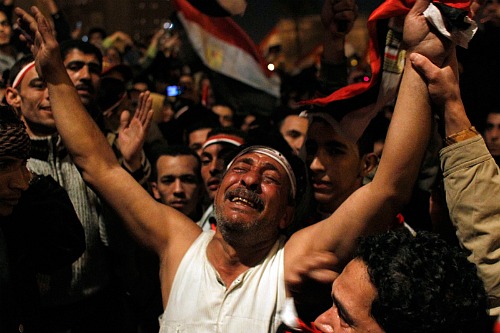Large scale protests of Egyptians who gained momentum from Tunisia’s “Jasmine Revolution” brought about a crisis that caused the autocratic government to lose its power on January 25th. Since then, Egyptians have marched in large grass-roots anti-regime demonstrations. Thousands of Egyptians have vented their rage against the autocratic rule of the U.S.-allied president Hosni Mubarak, who had reigned the country since 1981 and had been expected to try to pass the office to his son. They demanded reform in politics and economics. At least six protesters have been killed, hundreds injured and nearly 1,000 arrested. Additionally, the Egyptian government blocked Internet access across the country shortly after midnight on January 28th.

Egyptian protests became more intensified, but Mubarak insisted on staying in office until his term ended, after the next presidential election on February 2nd. Tens of thousands thronged in Cairo’s central Tahrir Square to keep up their campaign because they thought that president would only enact superficial democratic reforms. Finally, President Hosni Mubarak resigned and handed power to the military on February 12th. Though this appeased Egyptian protesters, it has had political and economical effects on the whole world including Korea. As global citizens in Korea, CNUians are obviously interested in this Egyptian protest and democratic revolt.
First, this Egyptian protest will clearly influence democracy in other Middle Eastern countries such as Yemen, Libya, Sudan and Jordan. Kim Tae-jun (Sophomore, Dept. of Business Administration) said, “Whenever I look at their situation, I can’t help but think of our pro-democracy movement in Korea in 1980. I also think of the sad situation of North Korea, China and Arab countries.” Unlike the Arab countries, where the winds of change are blowing, China and North Korea have taken a careful position regarding the Egyptian protests by controlling the media for the stability of their system: they are worried about the possibility of protests in their nations. Regarding the situations of the countries mentioned above, Kim also said,“I feel bad because I understand why Egyptians are doing it. Everybody knows group actions not the best way to express anger but other nations have to learn from Egypt at this time.”
On the other hand, people are concerned that considerable aftereffects would extend over a long period.Shin Jeong-hwan (Sophomore, Dept. of Premedicine) said, “I do not think that only democracy can guarantee our liberty, but socialism can as well. However this situation can be a good chance to change the Egyptian government. If the situation goes wrong, the nation would be in chaos. We should help Egypt to change for the better.”
From an economic viewpoint,if the main oil-producing countries fall into unstable situations, and the price of oil hits more than 110 dollars, and the situation drags out for a long time, the oil crisi would return. Choi Hwan-hui (Sophomore, Dept. of Chemistry) said, “Watching this movement in Egypt was like seeing the movement for democracy in Korea in the past and I consider it a nice starting point. But the one thing I care about is protecting many citizens who live in poverty, because there is the possibility that Egypt’s economy will decline.”
The Organization of Petroleum-Exporting Countries (OPEC) is under pressure from consumers to boost supply as most of the world’s benchmark crudes already surpass 100 dollars per barrel amid political unrest in North Africa and the Middle East.Lee Ji-sun (Sophomore, Dept. of Landscape Architecture) said, “I welcome Egypt’s democracy movement. However, I worry about oil prices increasing owing to the blockage of Suez Canal and other possible chain reactions. Though during the 30-year-long dictatorship, the U.S. gained interest through corruption in the Egyptian government, the question is why the United States is not involved.” As she pointed out, the U.S. should have supported democracy. However, the U.S. has not taken the lead in this event, because Egypt is one of the few pro-US countries in the Arab world.
Most CNUians have supported the Egyptian protests for democracy, and they think that all the countries of the world including Korea must help them proceed in the right direction without violence. In addition, CNUians want oil prices to be stable In addition to the hopes above, domestic stability and security in Egypt and other Arab countries must come first. Though the 18 days of Egyptian protest has almost reached the end, many problems remain that we must consider carefully. Even now, CNUians are still observing how the aftereffects of Egypt protest will resound across the world.
By Kim Han-na, Student Editor
#307 International Issue
김한나 기자
han_nah92@naver.com

